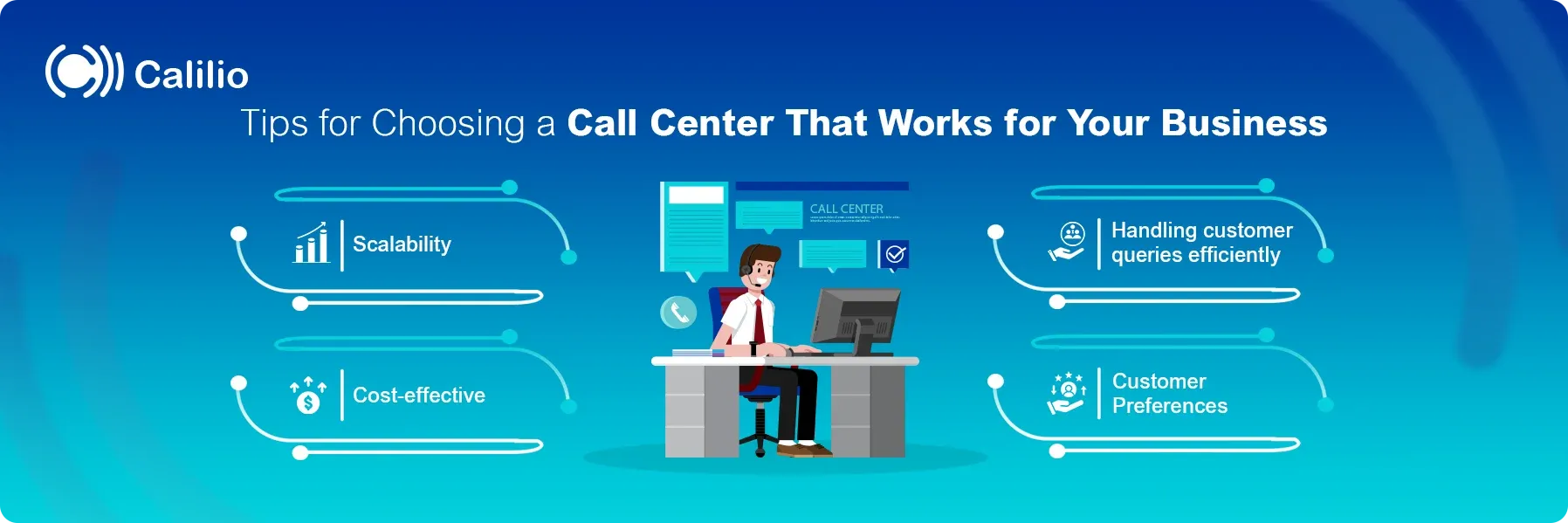Types of Call Centers and their Functionality

Summarize this blog with:
Call centers are crucial for ensuring customer satisfaction and operational efficiency. There are different types of call centers, each offering unique functionalities and benefits. Some call centers help you when you reach out, while others proactively contact you first.
In this article, we’ll explore the different types of call centers and their functions, so you know what to expect next time you need assistance. Understanding these various call center roles will make your experience smoother and more efficient.
What is a Call Center?

A call center is a customer service company that manages incoming and outgoing customer calls. The call center acts as a representative of the company and handles responsibilities such as responding to queries, offering technical help, and providing support. In essence, call centers manage customer service tasks to improve customer satisfaction.
Nowadays, call centers do more than just answer inquiries and provide assistance. They gather valuable feedback, increase customer loyalty, and provide tailored service experiences. These call centers hire skilled agents who can guide potential customers through purchases, generate leads, and make an overall business successful.
What is The Purpose of Call Center ?
A call center's primary purpose is to boost customer satisfaction and streamline operations. By outsourcing specific tasks to call center experts, you receive top-notch customer service and preserve company resources. Call centers can improve a company's customer acquisition and retention capabilities by optimizing and consolidating specific processes and services.
Type of Call Centers and Their Functionality
Different types of call centers cater to various businesses and customers. Here are some common type of call centers and their functionality that can be beneficial for your business:
1. Inbound Call Center
Inbound calls are incoming calls from customers. These calls allow the customer to connect with the agent directly and get customer service. People often call these call centers to ask queries regarding payment, problems, and customer questions.
Here are some benefits of an Inbound call center:
- An inbound call center helps design improved customer experiences.
- Outsourcing the inbound call center is a cost-effective customer service solution for businesses.
- Inbound call centers offer various automation and advanced features that help to improve productivity.
- It offers 24/7 support that ensures your customers can get assistance whenever needed.
The function of the inbound call center
The inbound call center's primary function is handling incoming customer calls. The center focuses on resolving customer issues, providing information, processing orders, maintaining records, and meeting performance metrics. Its skilled agents are responsible for helping customers and ensuring they get the service effectively and quickly.
2. Outbound Call Center
Outbound calls are outgoing calls to customers. This type of call center is used for various purposes, such as sales, market research, appointment setting, telesales, and telemarketing. Businesses outsource outbound calls to reach people and achieve specific business goals.
Outbound call centers benefit businesses by improving customer loyalty, reducing costs, and generating better leads. Here are some benefits you get from an inbound call center:
- With the help of an outbound call center, you can reach customers on their schedule.
- It helps to identify and qualify potential leads for the sales team.
- Maintain regular contact with customers to build stronger relationships.
- It helps to gather valuable customer feedback and market insight.
Function of Outbound Call Center
An outbound call center is a service where agents make calls to customers on behalf of a business. The main goal is to reach out to potential or existing customers to promote products, gather feedback, or provide information. It helps companies to maintain and grow their customer base by directly engaging with them over the phone.
3. Omnichannel Call Centers
Omnichannel call centers offer help to customers through various communication channels, like email, messaging, and phone calls. For instance, if you're chatting about a problem via messaging and switching to a call, you can pick up right where you left off without repeating your issue.
Here are some benefits of Omnichannel Call Centers:
- Customers can choose their preferred communication channel, providing more personalized and convenient support.
- Agents can access the same customer information across all channels, ensuring seamless interaction and continuity.
- Integrated data from different channels and resolving issues promptly leads to greater satisfaction and loyalty.
The function of Omnichannel call center
An omnichannel call center is built to offer seamless and integrated customer experiences across various communication channels. It features intelligent routing to direct customers, anticipate their needs, and provide real-time analytics to optimize performance. Omnichannel call centers help organizations improve efficiency and build strong customer relationships by streamlining workflows and reducing manual tasks.
4. Multichannel Call Centers
Multichannel call centers have separate systems for communication channels, such as phone, email, and chat. Agents only see information in one channel at a time, so customers must repeat themselves when switching between channels.
Here are some benefits of a multichannel call center:
- It helps collect and analyze data to give you insights into customer behavior and preferences.
- It enables representatives to establish meaningful relationships with customers.
- Multichannel contact centers increase effectiveness by simplifying procedures and consolidating multiple communication channels onto one platform.
Manage Customer Interactions Across Multiple Channels with Ease
Learn more about Calilio’s multichannel capabilities.
Function of Multichannel Call Centers
A multichannel call center helps customers using different communication methods. This type of call center is not only limited to phone calls; it also uses chat, email, text messages, and social media. This function makes it easier for customers to reach out to the call center in the most convenient and fastest way. Using multiple channels, the call center can provide better and quicker support, ensuring customers get the help they need quickly and efficiently.
5. Virtual Call Centers
A virtual call center is a cloud-based customer service that handles customer calls from different locations. This type of call center uses the Voice over Internet Protocol (VoIP) system, which allows you to make and receive calls over the Internet. This setup allows companies to hire the best agents from anywhere in the world and can be more flexible and cost-effective than a traditional call center.
Here are some benefits of a Virtual call center:
- It helps to reduce the cost of office space and utilization.
- Companies can hire the best agent from anywhere in the world.
- It provides 24/7 customer service with agents in different time zones.
Function of Virtual Call Centers
The function of virtual call centers is the same as that of other call centers, which help customers with their questions and problems. The main difference of this call center is that the agents work from different places, like homes, instead of all being in one office. They use the internet and special software to connect with customers through phone calls, emails, chats, and social media.
6. Automated Call Center
Automated call centers are Artificial Intelligence (AI)-based technologies that eliminate the requirement for human agents to be involved while performing tasks. When customers call, they might be greeted by a computer system that can understand and respond to their questions using pre-recorded messages or AI. This call center provides information quickly, works more efficiently, and frees up human agents to handle more complex problems.
Here are some benefits of an Automated call center:
- It makes call centers more efficient and productive.
- It reduces the cost of serving.
- It improves employee experiences.
- It improves contact center metrics.
Function of Automated Call Center
The function of an Automated call center is to manage many customer service tasks without the help of a human agent using different kinds of software. The AI or computer software gives information about order status, account balance, and company hours automatically, but if the issue is complex, it can direct the customer to human agents.
How to Choose The Right Type of Call Center For Your Business?
Selecting the right call center for your business depends on your requirements and objectives. Here are some features of call center that help to choose the right call center:

- Scalability: The scale of the company and volume of your customer queries need to be considered. A virtual or automated call center could be the perfect solution if you have a high volume and require support around the clock.
- Handling customer queries efficiently: The complexity of the customer issues you encounter. Automated call centers work well for handling basic questions and routine inquiries. However, if your business deals with more complex problems that require personalized attention.
- Cost-effective: Your budget is another crucial factor to consider. Virtual call centers can be more cost-effective because they reduce expenses related to physical office space, utilities, and equipment.
- Customer Preferences: Evaluate how your customers prefer to communicate. A multichannel call center can be useful if your customer prefers various communication methods such as email, phone, chat, and social media.
By assessing these variables, you can choose a call center that aligns with your business requirements and delivers top-notch customer service.
Final Verdict
A call center comes in different types and offers different features to fulfill the specific business requirement. Inbound call centers manage incoming calls by assisting customers with inquiries, issues, or purchases. Outbound call centers place phone calls to customers for purposes such as sales, surveys, or follow-ups.
Virtual call centers allow agents to work remotely, including from their own homes, resulting in cost savings and providing flexible hours for employees. Call centers play a vital role in helping businesses uphold high levels of customer service, cultivate lasting customer connections, and boost sales.
Calilio Introduces Affiliate Program
Earn 30% lifetime commission on every paid referral.
Turn your audience, network, or customers into a recurring revenue stream.

30% recurring commission on every paid referral

Lifetime earnings for as long as the customer stays subscribed

Unique referral link with real-time tracking

Perfect for agencies, consultants, creators, and SaaS partners

Frequently Asked Questions
What is call center functionality?
The call center functionality includes handling inbound and outbound calls, helping customers with their problems, responding to customer needs, selling and providing information about products and services, and processing orders.
What are the differences between inbound and outbound call centers?
How does technology improve call center operations?

Still have questions?
Can’t find the answer you’re looking for? Please chat with our friendly team.
Stay in the loop
Get the latest call insights, trends, and updates delivered straight to your inbox.
By subscribing, you agree to receive updates from Calilio.
You can unsubscribe anytime.